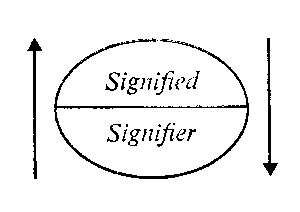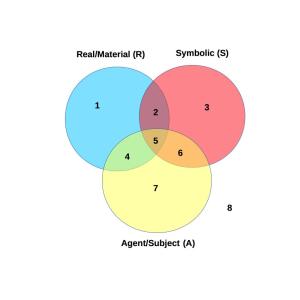 The open of Hegel’s Phenomenology of Spirit dramatizes our alienation in language and the perpetual inadequacy of the symbolic with respect to the real. In the chapter entitled “Sense-Certainty: Or the ‘This’ and ‘Meaning'”, Hegel begins by noting that “[t]he knowledge or knowing which is at the start or is immediately our object cannot be anything else but immediate knowledge itself, a knowledge of the immediate or of what simply is” (58). Hegel takes as the beginning point the apprehension of that which is given in sense-certainty: the rich world of beings that is right there before us. “Because of its concrete content”, Hegel continues, sense-certainty immediately appears as the richest kind of knowledge, indeed a knowledge of infinite wealth for which no bounds can be found, either when we reach out into space and time in which it is dispersed, or when we take a bit of this wealth, and by division enter into it” (ibid.).
The open of Hegel’s Phenomenology of Spirit dramatizes our alienation in language and the perpetual inadequacy of the symbolic with respect to the real. In the chapter entitled “Sense-Certainty: Or the ‘This’ and ‘Meaning'”, Hegel begins by noting that “[t]he knowledge or knowing which is at the start or is immediately our object cannot be anything else but immediate knowledge itself, a knowledge of the immediate or of what simply is” (58). Hegel takes as the beginning point the apprehension of that which is given in sense-certainty: the rich world of beings that is right there before us. “Because of its concrete content”, Hegel continues, sense-certainty immediately appears as the richest kind of knowledge, indeed a knowledge of infinite wealth for which no bounds can be found, either when we reach out into space and time in which it is dispersed, or when we take a bit of this wealth, and by division enter into it” (ibid.).
However, Hegel is quick to add that this knowledge which seems richest, is actually poorest in truth. “All that it says about what it knows is just that it is; and its truth contains nothing but the sheer being of the thing” (ibid). What we encounter here is a drama of language or the symbolic; a frustrating impotence that haunts all speech. Hegel notes this in a couple of ways a moment later:
We write down this truth [that it is night]; a truth cannot lose anything by being written down [or can it? me], any more more than it can lose anything thorough our preserving it. If now, this noon, we look again at the written truth we shall have to say that it has become stale.
The Now that is Night is preserved, i.e., it is treated as what it professes to be, as something that is; but it proves itself to be, on the contrary, something that is not. The Now does indeed preserve itself, but as something that is not Night… (60)
The world becomes or changes, yet the language remains fixed like a statue. This is why, later, in his seminar, Lacan would associate language and death. Life is that which becomes and changes, yet when it’s captured in language it is alienated by the trace of the signifier that preserves itself as that which is not. This is a secret that every writer knows, for they find themselves trapped in the signifiers they have produced and from which they have since moved on. Writing is a sort of death in that the reader mortifies the author in the works that she has written, demanding that she live in the crypt of those words rather than write on.
Here, then, we encounter the first alienation of language; the first source of tragic despair embodied in the impotence of the word. The word is detached from its origin, from its moment of utterance, and travels throughout the world. Detached from its origin, it grows stale and is liable to take on any meaning whatsoever. John writes Revelation— perhaps –as a veiled political critique of Rome. Today it is read as a prophecy about the end of the world.
Hegel continues,
[i]t is as a universal too that we utter what the sensuous [content] is. What we say is: ‘This’, i.e., the universal This; or, ‘it is’, i.e. Being in general. Of course, we do not envisage the universal This or Being in general, but we utter the universal; in other words, we do not strictly say what in this sense-certainty we mean to say. But language, as we see, is the more truthful; in that, we ourselves directly refute what we mean to say, and since the universal is the true [content] of sense-certainty and language expresses this true [content] alone, it is just not possible for us ever to say, or express in words, a sensuous being that we mean. (60)
Between what we utter and what we envision we encounter the despair of language; a despair that becomes all the more poignant in this case of trauma… Though perhaps this gap between the utterance and the envisioned is the original trauma at the heart of our being. Couples, friends, and enemies spin about for hours, days, and years in rage and despair trying to utter the this of the affect, of the wrong, of the thing without being able to do so. As we say, words fail.
 And why is this? Because between utterance and what we envision there is an infinite gulf. Existence– the this, the experience, the affect, the thing –is composed entirely of singular terms. Language is composed entirely of general or universal terms. The “this”, the signifier “this”, is a general or universal or general term. Through the signifier “this” I envision this. I hope to utter to you this thing, experience, event, or affect here and now. Yet “this”, the signifier this, is every other this. My words fail. No matter how lush and erotic my description of the orange is, I don’t produce the experience of the orange in you. The words fall flat and stale, lacking the pungent citrus flavor and scent of the orange. The spoken, written, or uttered orange is a dead orange. This orange that I had at this time and on this occasion cannot be compared to any other orange. It was an incomparable orange. Yet the moment I utter it, it becomes a generic orange. It’s singularity is erased and lost.
And why is this? Because between utterance and what we envision there is an infinite gulf. Existence– the this, the experience, the affect, the thing –is composed entirely of singular terms. Language is composed entirely of general or universal terms. The “this”, the signifier “this”, is a general or universal or general term. Through the signifier “this” I envision this. I hope to utter to you this thing, experience, event, or affect here and now. Yet “this”, the signifier this, is every other this. My words fail. No matter how lush and erotic my description of the orange is, I don’t produce the experience of the orange in you. The words fall flat and stale, lacking the pungent citrus flavor and scent of the orange. The spoken, written, or uttered orange is a dead orange. This orange that I had at this time and on this occasion cannot be compared to any other orange. It was an incomparable orange. Yet the moment I utter it, it becomes a generic orange. It’s singularity is erased and lost.
This, then, is part of what it means to be alienated in language or the symbolic. This alienation has a two-fold character: On the one hand, it is the inability to say what we mean. I envision the thing, event, experience, or affect, but in striving to utter these things, I find my words are impotent. I am unable to say or convey what I mean. This is particularly acute in the case of trauma, where I endlessly circle around the trauma striving to say it, only to experience it endlessly slipping away. On the other hand, our alienation in language lies in the universality of language in opposition to or negation of the singularity of existence. Language presents us with nothing but general categories, generic terms, whereas existence presents us with nothing but things that differ.
And perhaps this is the difficulty with all talk of identities, triggers, and traumas. All talk of identity is doomed to fail because the moment we talk about identities– gay, straight, black, white, rich, poor, male, female, American, hispanic, etc. –we’re already talking in the domain of the universal, of general categories, that erase the singularity of people. Terms multiply endlessly as we strive to capture what exists in the net of language, only to find it fail again and again. “But that’s not me!” Within the ever proliferating system of categories we find forms of power where singularities find themselves enmeshed in a web of terms and categories presiding over their destiny, over how others relate to and treat them, without ever being able to truly utter them. Yet it cannot be otherwise. We cannot dispense with the alienation we encounter in language in the name of the singular for the singular cannot be uttered. And we cannot dispense with the singular as the auto-critique of the failure of all language. Instead we are condemned to forever shuttle back and forth between the universality of language and the abstraction of the utterance and the singularity of the existent treating each, endlessly, as the critique of the other.
 A delicate problem animates chapter 3 of Difference and Repetition. Deleuze wants to defend a pure concept of difference, an account of difference in itself, yet our experience is representational through and through. Everywhere we are creatures of habit that recognize beings and therefore do not encounter difference. We subordinate the beings of our experience to the same, similar, and the identical, assimilate what we experience to what we have experienced. Wesen ist gewesen. What, then, authorizes Deleuze to claim that there is something like difference in itself? Is it not the case, as Hegel and Kant perhaps suggested, that everything is always already mediated or subordinated to the logic of representation (identity in the concept, analogy in the judgment, opposition among predicates, and resemblance in perception)?
A delicate problem animates chapter 3 of Difference and Repetition. Deleuze wants to defend a pure concept of difference, an account of difference in itself, yet our experience is representational through and through. Everywhere we are creatures of habit that recognize beings and therefore do not encounter difference. We subordinate the beings of our experience to the same, similar, and the identical, assimilate what we experience to what we have experienced. Wesen ist gewesen. What, then, authorizes Deleuze to claim that there is something like difference in itself? Is it not the case, as Hegel and Kant perhaps suggested, that everything is always already mediated or subordinated to the logic of representation (identity in the concept, analogy in the judgment, opposition among predicates, and resemblance in perception)?



